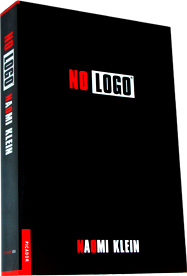Graham Reid | | 10 min read

Canadian author Naomi Klein's hotel window takes in an expanse of Auckland's glistening Waitemata Harbour, a blanket of cloudless sky and the graceful arc of motorways and harbour bridge between.
"And two great logos," she says with a laugh, pointing to a couple of overly familiar icons.
For someone demonised and derided by free-market economists and governments, 30-year-old Klein laughs a lot. She is also an animated and engagingly persuasive speaker, her language peppered with cutting-edge phrases like "culture-jamming" as befits someone of the internet generation.
She weighs questions carefully and conveys the sense that what she is saying is fresh and new to her, a rare attribute for someone who has been interviewed to exhaustion since her book, No Logo, was published almost two years ago and rocketed into bestseller lists.
"The Das Kapital of the growing anti-corporate movement," as one reviewer described it, has seen Klein hailed as the poster girl for anti-globalisation radicalism, a role she reluctantly accepts with self-deprecating humour. 
When activists have gathered to protest at World Trade Organisation conferences and free trade meetings, Klein has been interviewed as the astute, articulate -- and media-attractive -- face of protest.
Too often interviews have become about her and too seldom about what she considers the first genuinely international people's movement. She has become medium and message.
It is commonplace to observe that those fighting what they see as colonisation by multinational corporations and self-interested alliances of governments can be characterised by the metaphor of the ubiquitous but inchoate internet. But it is more nuanced than that.
The anti-WTO protests in Seattle in 99 was the defining moment, she says, when diverse hydra-headed forces gathered and realised they weren't alone. Anti-globalisation gatherings aren't single demonstrations but hundreds happening simultaneously.
"The corporations themselves created these coalitions, and the ambitiousness of the trade agreements created this convergence. The clear thread, though, is people responding to the privatisation of every aspect of their lives."
At a global level organisations like the WTO have sought to sever trade from everything - workers, the environment, culture - which affect it. Suggestions, therefore, that compromises can be reached between activists outside and delegates inside are misguided.
As she wrote recently: "The face-off is not between globalisers and protectionists, but between two radically different visions of globalisation. One has had a monopoly for the last 10 years. The other just had its coming-out party."
And No Logo arrived just as "the movement" was looking for a text to explain itself.
"No Logo certainly made me feel less alone," says Ed O'Brien of the English rock band Radiohead, which banned corporate advertising from its recent British tour. "She was writing everything I was trying to make sense of in my head."
"Seattle surprised me," says Klein. "The book was at the printer when that happened, it was eight months late and I was furious with my editor thinking we'd miss the moment."
But, she notes, those moments just keep happening: anti-globalisation protests in Quebec City, Gothenburg ... There's the G8 summit in Genoa in a fortnight. The Italian edition of No Logo is currently a top seller there, "because of Genoa."
"We're at a moment where people want a deeper understanding of what's motivating some of the young activists - and they're not getting it from the media. They're getting name-calling, insults, and the most wilful mischaracterisations.
"It used to frustrate me that we just endured such incredible name-calling. Now I think, 'Is that the best they can do?' We must be right if the most respected economic writers in the world can't do anything but just call us clueless or flat-earthers." 
She objects to the way language around the issues is distorted and misused. The term "globalisation" she considers unhelpful and bandied around as if we all agree on what it means. So the term "anti-globalisation" feeds an idea that "what you're fighting for is a kind of protectionism."
"I think you should use the right words, and what we are talking about is a set of economic policies being forced around the world ... the new liberalism."
Canadians liken her look to New Zealand as a warning about free trade. It isn't just a trade package, but involves the International Monetary Fund and structural adjustments to local economies to suit offshore bankers and corporations.
Governments are abdicating democratic responsibility and sovereignty in favour of international institutions, which they have been given no mandate to do.
"So what we're facing is a crisis in representative democracy. We vote for someone whose values we believe, then they delegate constitutional powers to international institutions like the WTO."
Klein suggests both Canada and the United States had federal elections where the North American Free Trade Agreement never came up as an issue. "So the idea you [politician] guys have a mandate to create the largest free trade zone in the world is absurd. Ireland had a referendum and the country voted to reject the expansion of the European Union, then their prime minister goes to Sweden and says this shouldn't interrupt the time line!"
Politicians also move into business and work for the companies which helped them into office, she says, citing her particular bete-noir, former Canadian PM Brian Mulroney, in Auckland on the same day to speak to business leaders and politicians and encourage New Zealand to join Nafta.
With a bemused smile, she notes politicians consistently disregard the concerns of their electorates, and cites environmental issues which citizens rate highly in polls but which politicians ignore.
It is also because of the transitory nature of politicians and comparative permanence of corporations that activists are directly targeting multinationals such as Nike, McDonalds, the Gap, Tommy Hilfiger, Adidas, Pepsi and Coke, and others.
"I wanted to write about this new kind of activism ... and the connection between the way marketing co-opts everything in youth culture and the way young people were being abandoned by these huge corporations."
The connection Klein saw was how brands are less products than notions of a lifestyle. It didn't matter who made the products -- Nike's sweatshops in Asia are often cited -- what was important was the image. 
Brands were hitched to stars (the Michaels, Jackson and Jordan) and the two became interchangeable. Posh Spice once told a reporter the Spice Girls, "wanted to be a household name ... like Ajax."
"Brands and stars have become the same thing," says media consultant Michael J. Wolf.
While the chapters of branding and globalisation in her book have captured the imagination, Klein says she came to those ideas later. She began writing about labour issues as they impacted on young people, and trying to find ways to debate the increasing casualisation of labour and consequent changes in the workforce and economic marketplace.
"We felt the labour movement had dropped the ball, this was 1993-94, and it was uninterested in dealing with this exploding sector, the world of temps and part-timers. We saw labour protecting their own butts and not going to where the people worked, although it's hard to organise fast-food workers because of high turnover and there's not much payoff.
"We wanted to develop a language to discuss this because part of the [corporate] strategy was to diminish them as jobs, they were just jobs for kids, pocket money. Never mind this was the only growing sector."
Jobs are no longer considered permanent although many people work years in areas which were once considered casual employment, and there have been increasing moves to "part-time" the workforce. "Left-wing economists are still stuck in a traditional Marxist analysis where the workers must own the means of production, with no understanding that corporations don't want to own the means of production anymore.
"In the corporate world now you have super megabrand that owns a huge amount of intellectual property but wants as little actual property as possible. Then there are the supplier corporations which own the temps and the factories and the franchises. We don't have a left analysis of that."
From the right she hears that casualisation isn't an issue because employees aren't "workers" any more as many are offered stock.
"So you don't work, you are a stockholder. Even Wal-Mart employees own shares." 
What this means,she says, is if a company lays off employees and its stock rises, the stock report makes the front page and the human costs are buried: "The marketing of the market has been an incredible triumph."
What has made anti-globalisation activism difficult to analyse is it fits no previous model of radical activity and has adopted no distinguishable style which can be appropriated into commodification. The dispersed, non-centrist new movement has no visible style to co-opt.
"If you invest too heavily in the accessories of rebellion then you are very vulnerable to co-optation. One of the things I find most heartening is how un-style driven it is.
"I hear this criticism, 'It's fashionable to go to Genoa or Seattle'. I've seen fashionable movements come and go." The present movement is not interested in being activist because it's fashionable.
"It's not really youth vanguardist either. The student anti-sweatshop movement, which has just exploded in the US, is young people of university age working with people their parents' age who've been with this for 30 years.
"It lacks a lot of that self-conscious radicalism of youth you would see in hippie movements."
There have been numerous attempts to co-opt her and she is frequently invited to speak to corporates and advertising people: "I don't do it just out of self-respect. I never wanted to be a brand consultant and it's not respectful to my friends. [The companies] do it out of reflex, they're indiscriminate. They're cool-hunters and they don't care."
Klein says while corporations are superficially adopting the argot of the activists' ideas, the activists are deepening their critiques "to get at the systems behind the symptoms" and questioning the nature of capitalism.
The strength of this movement is it lacks a coherent centre. It's everywhere, and not just a manifestation of Western disillusionment with corporate culture.
No Logo represents the experience of privileged North American Western young people who grew up in an extremely commercial culture and explores what's bringing them to the streets at this point.
"But it doesn't explain what's bringing people to the streets of New Delhi, or marches from Chiapas to Mexico City by 200,000 people. No Logo is just a tiny glimpse of it, the most media-friendly digestible part of it." 
However, she concedes the movement's weakness may also be that it lacks a centre.
"Obviously there needs to be direction and alternatives, you can't just go from protest to protest, people will burn out. There are now international networks and a globalisation of a lot of these ideas on the part of the resistance movement.
"Its most visible form has been big demonstrations, but I think that now that there's an awareness of itself as an international effort, we are going to see a return to the local."
And Klein laughs again.
She's caught herself saying what sounds like a Coke slogan.
This article appeared in the New Zealand Herald in 2001







post a comment